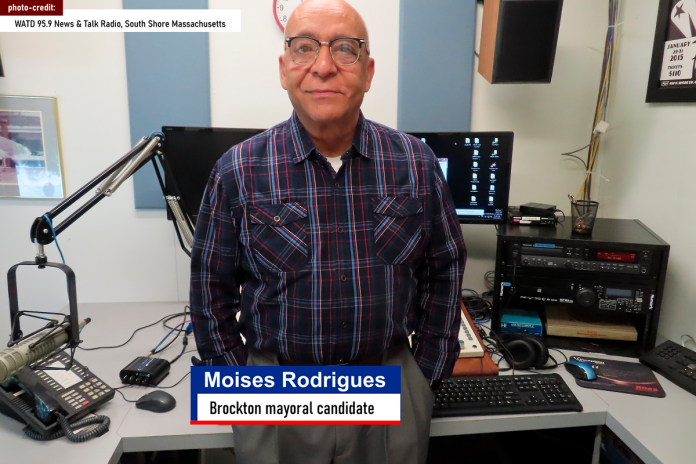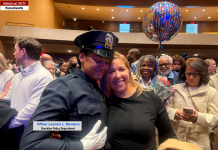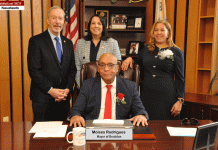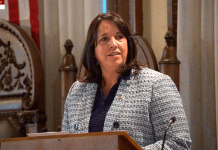BROCKTON, Mass. (InfoHaïti.net) – Brockton City Councilor Moises Rodrigues joined WATD’s Christine James for an in-studio conversation about his mayoral campaign, offering a detailed look at his record, his personal journey, and the key priorities he says would guide his administration if elected on November 4.
From Cape Verde to City Hall
Rodrigues, who immigrated to the United States as a teenager after living in Angola and Cape Verde, described his path from Brockton High School to public service. “I came to this country at 14 or 15, went to Brockton High — at the time the largest high school on the East Coast — and later joined the U.S. Navy for six years,” he told James. After military service, Rodrigues worked at Brockton Hospital, where he directed interpreter services and community outreach. He later served as a child-protection coordinator for the Archdiocese of Boston and as executive director of the Cape Verdean Association.
First elected to the Brockton City Council in 2013, Rodrigues spent nearly eleven years in office and served as interim mayor from July 2019 to January 2020. That seven-month period, he said, gave him “firsthand experience leading the city through complex issues.”
“Back in 2019, a lot of people wanted me to stay on as mayor,” Rodrigues said. “At that time, I felt it wasn’t my moment yet. But now, six years later, the community believes this is the right time — and so do I.”
Public Safety and Perception
Asked about his top priorities, Rodrigues cited public safety as a central pillar of his campaign.
“Statistically, crime is down,” he acknowledged. “But we can’t ignore the perception of crime. When people in surrounding towns talk about Brockton, they often say it’s unsafe — and the only time Boston media mentions us is when there’s a crime story.”
Rodrigues said his administration would focus not only on law enforcement but also on crime prevention and neighborhood quality of life. “Our police do a great job solving crimes,” he said, “but we need to invest more in preventing them — through youth engagement, mental-health support, and community partnerships.”
He grouped his campaign themes into two overarching goals: improving quality of life and ensuring fiscal responsibility. “Making sure our streets are safe and clean, our schools are strong, and our residents feel secure — that’s one,” he explained. “The other is managing taxpayers’ money wisely so that the people who pay for services actually see value in return.”
Balancing the Tax Base
Rodrigues said Brockton’s financial structure needs rebalancing. “Right now, about 73 percent of our local revenue comes from residential property taxes, and only around 23 or 24 percent from commercial properties,” he noted. “That imbalance puts too much pressure on homeowners.”
Rather than raising commercial rates, Rodrigues proposed expanding the business tax base. “We need more businesses, more development, so that the overall pie grows,” he said. “That’s how we relieve the burden on residents while strengthening city finances.”
Clean Streets and Civic Pride
Turning to what he called ‘urban cleanliness,’ Rodrigues said that visible neglect undermines community morale. He credited his grandmother for teaching him that “even when you’re poor, you can still be clean.”
“There’s no reason for grass to grow out of our sidewalks or around light poles like trees,” he said. “We can’t make Brockton as wealthy as Wellesley or Newton overnight, but we can make it a clean Brockton.”
He pledged to restore street-cleaning programs, recruit residents for neighborhood maintenance, and consider hiring homeless individuals through stipends funded in part by opioid-settlement resources.
“Many of our unhoused residents live on our streets,” Rodrigues said. “Why not pay them to help keep those streets clean? Give them purpose and a chance to re-enter the workforce.”
He cited a prior initiative under former Mayor Harrington that employed “red-shirt” workers from shelters to sweep sidewalks — a model he hopes to revive.
Supporting Youth and Inclusion
Rodrigues said he would rebuild the Mayor’s Youth Advisory Council, a program that once drew students from Brockton’s high schools, middle schools, and parochial institutions to advise city leaders. “It gave young people a seat at the table,” he said, adding that he also intends to recreate a Community Advisory Committee representing Brockton’s diverse populations — U.S.-born residents, Cape Verdean, Haitian and LatinX —
“We used to meet every month to talk about what the community needed,” Rodrigues recalled. “We’ll bring that back, because government should listen before it acts.”
He said these groups would strengthen civic unity and help shape programs in housing, public health, and education.
Small-Business Development
Rodrigues emphasized the need for a Small Business Advisory Council to assist entrepreneurs and streamline permitting. “Running a city isn’t about being an expert in everything,” he said. “It’s about putting the right people in the right places to advise you.”
He illustrated the challenge with a local comparison:
“If you live in Bridgewater and need a roofing permit, you can get it the same day,” he told WATD. “In Brockton, it can take two weeks. Why? We can fix that. These are low-hanging fruits — simple improvements that make life easier for residents and businesses.”
The proposed council, composed of established business owners and new entrepreneurs, would work with city planners, licensing officials, and building inspectors to cut red tape and promote investment.
Schools and Fiscal Accountability
Addressing recent headlines about an $18 million shortfall in Brockton Public Schools, Rodrigues attributed the crisis to mismanagement rather than misconduct.
“No one stole anything,” he said. “The problem was that spending continued as if enrollment hadn’t dropped.”
Rodrigues explained that the district lost between 800 and 1,000 students after COVID-19, each representing roughly $18,000 in state aid. “That’s about $18 million gone,” he said. “But the system kept signing contracts and making purchases as if the money were still there — with no guardrails or stop signs. It’s like running a household: if you only have $500, you can’t spend $1,000.”
He said the city has since imposed stronger controls to prevent future overspending and would continue reinforcing financial oversight under his administration.
Experience and Leadership
Rodrigues contrasted his record with that of his opponent. “Out of the eight people who ran, none had experience in city government,” he said. “My opponent has served on the council but never as president or committee chair. I’ve led both, managed budgets, supervised staff, and already done the job as mayor.”
He cited his negotiation of the Russell Lopes lawsuit, a $45 million claim against the city that he said he settled for $4.5 million, averting a potential bankruptcy. “That was a critical moment,” Rodrigues said. “We saved the city from a financial disaster.”
Building Trust Across Communities
Fluent in several languages, Rodrigues said his background allows him to connect with Brockton’s diverse residents. “The fact that I speak nearly five languages helps me reach across ethnic lines,” he said. “It’s about inclusion — making everyone feel part of the process.”
He also described his long involvement with local churches and youth programs, including a summer employment initiative that provides jobs to 75 young people and activities for 300 children. “I think one of my gifts is engaging with young people,” he said. “They trust me. I understand what they’re going through, and I want them to know they have opportunities in Brockton.”
A Vision for a Collaborative City
Rodrigues said his campaign is rooted in collaboration and problem-solving, not partisanship. “I’ve managed businesses and negotiated agreements,” he said. “What Brockton needs is someone who can bring people together — across departments, across backgrounds, across ideas.”
He reiterated his intention to expand partnerships with community organizations, echoing proposals he made earlier this year at a fundraiser in Dorchester’s Cesaria Restaurant, where he outlined plans for a Community Organizations Council and a Small Business Advisory Committee. Both initiatives, he said, would ensure that the mayor’s office stays connected to grassroots leadership and economic stakeholders.
“No single person can fix everything,” Rodrigues said. “But if you gather the right mix — neighborhood groups, small-business owners, youth leaders — you can find real solutions.”
Those committees, he added, would serve as permanent advisory bodies to City Hall, reflecting Brockton’s changing demographics and economic needs.
Clean Government, Clean Streets
Linking themes from his earlier speeches and WATD interview, Rodrigues said that a cleaner, safer, more transparent city begins with accountability at every level.
“Whether it’s our sidewalks, our budgets, or our schools,” he said, “cleanliness and integrity go hand in hand.”
He pledged open communication with residents and frequent public updates on spending, public safety, and development projects. “The people deserve to know where their money is going,” he said.
Looking Ahead
Rodrigues closed the interview by thanking WATD and Christine James for what he called “an honest conversation about Brockton’s future.” He said that if elected, he hopes to continue appearing regularly on air to keep residents informed.
“It’s an honor to be here,” he said. “I intend to become mayor of this city — and to come back on this program as often as you’ll have me.”
Rodrigues acknowledged that Brockton lacks its own local radio station, which makes regional outlets like WATD essential for civic engagement. “We need more ways to reach our residents,” he said. “Information builds trust, and trust builds community.”
As Election Day approaches, Rodrigues’s message to voters remained consistent with the platform he has outlined at campaign events across the city: public safety, fiscal balance, clean streets, youth empowerment, and business growth.
“I want to make Brockton a place where people feel proud to live,” he told WATD. “A city that’s clean, safe, and united — a city that works for everyone.”






